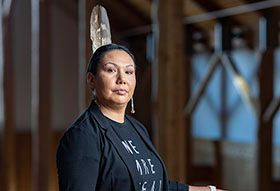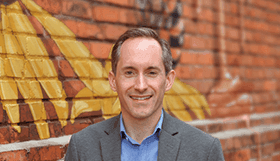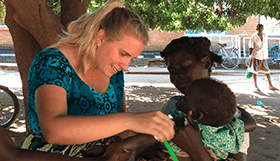2012 Forward under 40 Award Honoree
UW Major: Chemistry
Age: 38 | Pasadena, CA
Professor at the California Institute of Technology
Think of your high school chemistry lab shrunk down to the size of a chip smaller than the palm of your hand. Now you are in Rustem Ismagilov's world.
A former researcher at Harvard University and professor at the University of Chicago, Ismagilov recently moved to the California Institute of Technology (CalTech) to become the John W. and Herberta M. Miles Professor of Chemistry and Chemical Engineering. He has also moved his research group, which has already published an astounding 112 papers.
Ismagilov uses a tool called microfluidics, systems of hair-thin pipes that move around tiny droplets of liquid, combine them, analyze their chemistry, or sort bits of DNA. These devices have the possibility of revolutionizing medical diagnostics and facilitating new types of experiments. Another potential use is tracking how HIV medicines are working by measuring microscopic substances in patients' blood much more efficiently and affordably.
Steve Nelsen of the UW-Madison Department of Chemistry says Ismagilov rapidly developed into one of the most important researchers in the microfluidics field.
Ismagilov says he uses a multidisciplinary approach to unearth chemical and biological complexity on the molecular and systemic levels. Chemistry, physics, biology, and engineering contribute to his advances in microfluidic techniques.
Ismagilov was recognized as the most outstanding chemist under the age of forty by the American Chemical Society in 2008, and his list of awards includes high honors from the National Institutes of Health and the National Academy of Sciences.
Nelsen says Ismagilov's work investigating blood flow allowed him to explain why blood capillaries have a unique shape, and that finding could have applications for disease diagnosis or medicines in the future. He also lauded Ismagilov's work on crystallizing proteins, the building blocks of life that are difficult to analyze with methods other than X-ray crystallography.
"Rustem's research is of seminal importance," Nelsen says. "I would not be surprised if it eventually results in a Nobel Prize in Chemistry."
In his own words
What advice would you offer to graduating seniors?
Get a job.
What is the greatest benefit of a UW degree?
Getting a job (hopefully).
Are you a cat person or a dog person?
I am a mouse person.
What was your first job?
Honestly don't remember — something agricultural.
What's your guilty pleasure?
Russian humor.
If you could trade places with any person for a week, living or dead, with whom would it be?
Anyone who is not dead.




